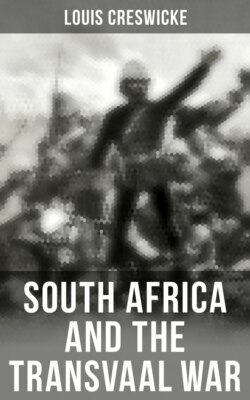Читать книгу South Africa and the Transvaal War - Louis Creswicke - Страница 33
На сайте Литреса книга снята с продажи.
ОглавлениеCHAPTER V
Table of Contents
MR. RHODES
Table of Contents
Of the chief personage in the political and financial history of South Africa it is desirable we should know something definite, though space does not allow of any long appreciation of all he has accomplished for the advancement of the empire. The Right Hon. Cecil John Rhodes was born in 1853. He was the fourth son of the late Rev. Francis W. Rhodes, Rector of Bishop Stortford. In 1871 he went to South Africa, there to join his brother Herbert, who was engaged in cotton-growing in Natal. His constitution was delicate, and it was believed that a journey to the Cape would be beneficial to him. In 1872 he returned in much better health to England, and entered Oriel College, Oxford. While there he contracted a chill, and found himself again under orders to return to South Africa. At that time Herbert Rhodes had forsaken cotton-growing, and had become fascinated by the prospect of wealth offered by the diamond fields in the locality now known as Kimberley. The two youths joined hands, and in 1873 we find the elder brother leaving his claim in charge of the younger, the hard-working, astute, and masterful Cecil, whose name has become almost a household word. The young man, who took his degree at Oxford in the interval of his work, brought to every task he attempted an educated mind and a certain dogged obstinacy, which caused him to surmount all difficulties. He prospered amazingly. But money, instead of numbing his activities, only sharpened them, and he soon began to formulate his ideal—the Utopian dream of an entirely British Africa from the Cape to the Zambesi!
THE MATABELE WAR—DEFENDING A LAAGER.
Drawing by R. Caton Woodville.
His most conspicuous financial work was the De Beers Company, of which we have treated elsewhere. From one big venture he went to others more gigantic still. The famous Chartered Company and the splendid province of Rhodesia came virtually into existence as the result of his magnificent foresight. In 1881, in Basutoland, Mr. Rhodes, the newly-elected member for Barkly West, had the good fortune to meet General Gordon, who was struck at once by the immense ability of the young man. In character, it seems, they were the extremes that meet! These two men, of equally strong personality, had an antagonism of character which, clashing, gave forth a resonance that was vastly inspiriting.
Gordon and Rhodes would take long walks together, and discuss the affairs of nations. The General, who was as dictatorial as his associate, on several occasions severely criticised the opinions of young Rhodes. "You always contradict me," he declared. "I never met such a man for his own opinion. You think your views are always right, and every one else's wrong. You are," he went on to say, "the sort of man who never approves of anything unless you have had the organising of it yourself."
It was a new edition of the pot calling the kettle black, and afforded much amusement to onlookers.
On another occasion Gordon begged him to remain in Basutoland and work with him, but Rhodes refused. He demonstrated that his work lay in Kimberley, and there he would remain. "There are very few men in the world," argued Gordon, "to whom I would make such an offer. Very few men, I can tell you; but, of course, you will have your own way."
Once, when they were together, Gordon related to Rhodes the story of an offer of a room full of gold which had been made to him by the Chinese Government, after the suppression of the Tai-Ping revolt. "What did you do?" asked Rhodes. "Refused it, of course. What would you have done?" said Gordon. "I would have taken it," answered Rhodes, "and as many more roomfuls as they would give me. It is no use for us to have big ideas if we have not got the money to carry them out."
When Gordon went to Khartoum he invited Rhodes to accompany him, but Rhodes refused. He accepted the offer made by the same post of the Treasurer-Generalship in the Scanlin Ministry. In 1884 he became Deputy-Commissioner for Bechuanaland, which, as the key to South Africa, he determined to keep under his watchful eye. He was at the same time Treasurer-General of Cape Colony. In 1889 he became Director of the British South Africa Company and Chairman till the fiasco of 1896, at which time he was Premier of Cape Colony. In addition to holding these posts, his activities have been unending. He has been the moving spirit in every enterprise for the expansion and development of South Africa. He has gained the esteem of the loyal Dutch, and has succeeded in making himself feared if not beloved by the disloyal. His great work of attempting to weld together the two races into one united people is for the nonce suspended, but should life be spared him he will doubtless see the realisation of his dream. In addition to his other labours Mr. Rhodes was Commissioner of the Crown Lands in 1890–94, Minister of Native Affairs 1894–95, and served in Matabeleland in 1896.
